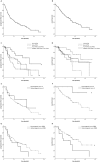Distinctive germline expression of class I human leukocyte antigen (HLA) alleles and DRB1 heterozygosis predict the outcome of patients with non-small cell lung cancer receiving PD-1/PD-L1 immune checkpoint blockade
- PMID: 32554614
- PMCID: PMC7304840
- DOI: 10.1136/jitc-2020-000733
Distinctive germline expression of class I human leukocyte antigen (HLA) alleles and DRB1 heterozygosis predict the outcome of patients with non-small cell lung cancer receiving PD-1/PD-L1 immune checkpoint blockade
Abstract
Background: Nivolumab is a human monoclonal antibody against programmed cell death receptor-1 (PD-1) able to rescue quiescent tumor infiltrating cytotoxic T lymphocytes (CTLs) restoring their ability to kill target cells expressing specific tumor antigen-derived epitope peptides bound to homologue human leukocyte antigen (HLA) molecules. Nivolumab is currently an active but expensive therapeutic agent for metastatic non-small cell lung cancer (mNSCLC), producing, in some cases, immune-related adverse events (irAEs). At the present, no reliable biomarkers have been validated to predict either treatment response or adverse events in treated patients.
Methods: We performed a retrospective multi-institutional analysis including 119 patients with mNSCLC who received PD-1 blockade since November 2015 to investigate the predictive role of germinal class I HLA and DRB1 genotype. We investigated the correlation among patients' outcome and irAEs frequency with specific HLA A, B, C and DRB1 alleles by reverse sequence-specific oligonucleotide (SSO) DNA typing.
Results: A poor outcome in patients negative for the expression of two most frequent HLA-A alleles was detected (HLA: HLA-A*01 and or A*02; progression-free survival (PFS): 7.5 (2.8 to 12.2) vs 15.9 (0 to 39.2) months, p=0.01). In particular, HLA-A*01-positive patients showed a prolonged PFS of 22.6 (10.2 to 35.0) and overall survival (OS) of 30.8 (7.7 to 53.9) months, respectively. We also reported that HLA-A and DRB1 locus heterozygosis (het) were correlated to a worse OS if we considered het in the locus A; in reverse, long survival was correlated to het in DRB1.
Conclusions: This study demonstrate that class I and II HLA allele characterization to define tumor immunogenicity has relevant implications in predicting nivolumab efficacy in mNSCLC and provide the rationale for further prospective trials of cancer immunotherapy.
Keywords: B7-H1 antigen; antigen presentation; lung neoplasms; tumor biomarkers.
© Author(s) (or their employer(s)) 2020. Re-use permitted under CC BY-NC. No commercial re-use. See rights and permissions. Published by BMJ.
Conflict of interest statement
Competing interests: None declared.
Figures


References
-
- Horn L, Spigel DR, Vokes EE, et al. Nivolumab versus docetaxel in previously treated patients with advanced non-small-cell lung cancer: two-year outcomes from two randomized, open-label, phase III trials (CheckMate 017 and CheckMate 057). J Clin Oncol 2017;35:3924–33. 10.1200/JCO.2017.74.3062 - DOI - PMC - PubMed
Publication types
MeSH terms
Substances
LinkOut - more resources
Full Text Sources
Medical
Research Materials
